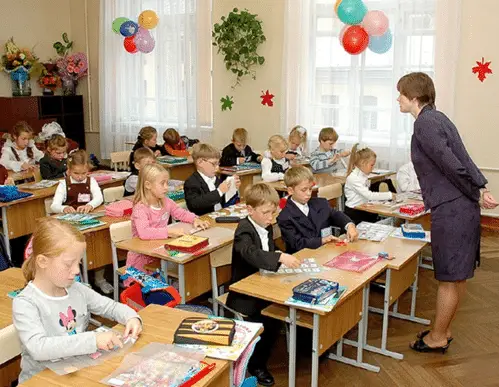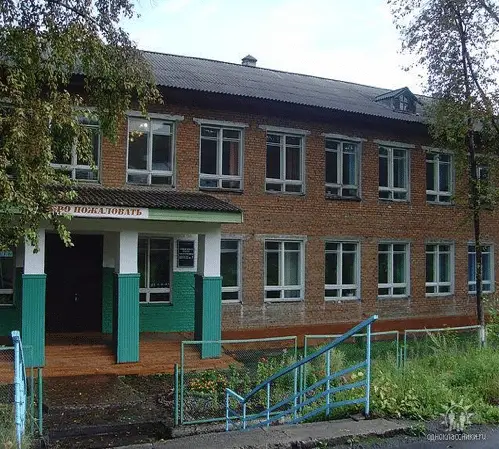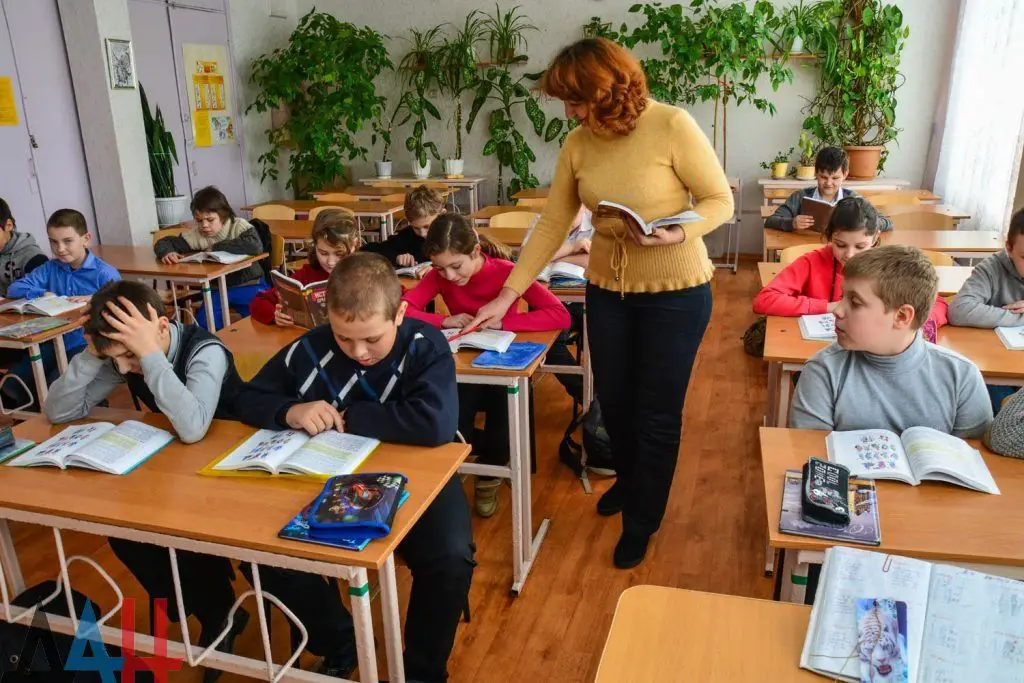The following is lesson 6 of the Моя Россия advanced Russian lesson series. Note that all bold words and phrases have annotation below. Red words and phrases indicate the subject of this blog entry’s grammar lesson. Asterisks indicate slang.
Работать в российской школе может любой, кто получил высшее педагогическое образование, а также те, кто учился не в педвузе, а проходил курс педагогики и психологии в университете. Я училась на историческом факультете и проходила эти курсы на пятом году обучения, так что я могла стать учителем истории и обществознания.Когда я закончила университет, я захотела работать в школе учителем истории. Многие мои друзья пошли работать в школу – я была уверена, что знаю, что делаю, и что меня ждет. Так что, с полной уверенностью в успехе, я начала готовить свое резюме.

Говорят, что получить должность учителя в школе обычно довольно просто, поскольку не так много тех, кто хотел бы там работать. По слухам, проще всего обзвонить несколько ближайших школ и спросить их, не нужен ли им учитель. Скорее всего, долго висеть на телефоне не придется, вакансия найдется довольно быстро. Однако, как я это поняла позже, все совсем иначе.
Почему так? Все очень просто. В российский школах обычно преподаванием занимаются пожилые женщины-учителя, многие уже в пенсионном возрасте. Правительство стало активно поддерживать политику найма на работу молодых учителей, только что закончивших вуз. Эта инициатива была принята на ура, ведь многие пожилые преподаватели сами хотят уйти, а некоторым другим по состоянию здоровья уже достаточно сложно учить детей. Зарплаты подняли (особенно это заметно в Москве, где у учителей самые высокие зарплаты в России); придумали систему поощрения за активное участие учителя в школьной жизни; стали отправлять учителей отдыхать в российские пансионаты (на средства профсоюзов); в меру финансовых возможностей оборудовали классы современной техникой. Все эти меры привели к тому, что профессия учителя стала привлекательнее для молодого поколения.
К сожалению, когда я решилась наконец-то начать отправлять свое резюме в школы, свободных рабочих мест для учителей истории и обществознания либо не оказывалось, либо они были, но в таких школах, куда берут только учителей высшей квалификационной категории (чем больше опыт работы и чем лучше оценки у учеников, тем выше уровень квалификации их учителя). Случилось так, что время получения мною диплома о высшем образовании совпало с экономическим кризисом, который привел к повышению уровня безработицы. Более того, как я уже сказала, работа учителя обрела популярность среди молодого поколения, поэтому кандидатов на вакансию в школе стало гораздо больше. Эта перемена произошла очень быстро: не успела я оглянуться, как найти работу в школе практически невозможно.

Схема школьного образования в России несколько иная, чем в Европе или Америке. Я немного расскажу об этом.
В одном классе обычно обучается от 20 до 30 человек (это зависит от школы). Ребенок становится школьником, когда он поступает в 1 класс. Начальная школа – это первые четыре года обучения; с 5 класса начинается средняя школа. Старшая школа начинается с 10 класса и заканчивается в 11. Класс формируется еще на первом году обучения, обычно одни и те же люди учатся бок о бок до 11 класса. Или до того момента, когда классы формируются заново, так как в некоторых школах с какого-то года обучения детей делят по направлениям: класс естественных наук, класс гуманитарных наук, математический класс. То есть у тех детей, которые учатся в математическом классе, больше уроков математики, чем у тех, кто учится в гуманитарном; зато дети из гуманитарного класса активнее учат историю, языки, литературу и т.д.
В каждой школе может быть сформировано несколько первых классов, несколько вторых, несколько третьих и т.д. Они обычно называются по году обучения и по букве алфавита: 1а, 1б, 1в, 2а, 2б, 2в… В таком случае все первые классы от “а” до “в” называются “параллелями.” В некоторых школах в старшей школе количество классов в параллели меньше, чем в средней. Это потому, что при сдаче государственного экзамена в 9 классе некоторые дети не получают проходной балл, принятый для этой школы. Это не беда, они могут пойти в другую школу, где нет такого проходного балла и где в старшую школу берут всех. Все равно для поступления в университет не важно, какую школу ты закончил, а важны результаты ЕГЭ – Единого Государственного Экзамена (который сдаётся после 11 класса), а еще в некоторых университетах при поступлении нужно сдать дополнительные экзамены.
Все мои знакомые-учителя нашли себе работу до начала кризиса, но далеко не все преподают до сих пор, так как преподавание – занятие не для каждого. Работа учителя – это тяжкий труд, хоть все же это еще и очень интересно. Мне так и не довелось поработать в школе, но я не жалею об этом: сейчас я нашла себе другие занятия.
Vocabulary and Cultural Annotations

Педвуз – This is an abbreviation made from two words: “пед” = “педагогический” (pedagogical or educational) and “вуз” = “высшее учебное заведение” (higher educational institution, university). Thus, “педвуз” means a “pedagogical university”, a university for those who want to teach in the future.
Педагогика – Pedagogy.
Обществознания – Social Studies.
Висеть на телефоне – hanging on the phone; to spend a long time on the phone. This is a standard phrasing in Russian (but it is informal).
Вакансия – Vacancy.
Преподавание – Teaching.
Преподаватель – Teacher.
Принять на ура – To be delighted with something, to be enthusiastic over something. Literally it translates as “to accept with a cheer”.
Поощрение – Incentives.
Зарплаты подняли – Raised salaries. In Moscow, the average teacher salary is 83,174 rubles per month. The average salary in Moscow across all professions is about 50,000 rubles per month. There are still disparities between schools, however – not all teachers make this wage, although it is the statistical average.
Пансионат – This is usually translated as “boarding house”, but is usually a type of resort or retreat; These were developed under the Soviets, usually in a forested or seaside location as in connection with unions for specific professions. These were places where workers could rest, receive medicinal treatments, and sometimes attend professional development classes. While fewer today, and most often private institutions open to anyone, these continue to function in much the same way.
Средства – Resources, funds, means.
Профсоюз – Trade union or labor union.
Поколение – Generation.
Квалификационная категория – Qualification category; in Russia teachers get a qualification category depending on their working experience and on their pupils’ grades. A young teacher just entering the profession has no category.
Диплом о высшем образовании – Higher education diploma.
Привел к повышению уровня безработицы – Led to an increase in unemployment levels.
Не успеть оглянуться – In no time, before you know it; this is an idiom. It literally means “to not have time to glace around.”
Несколько – A few; but in this case it has another meaning: somewhat, slightly.
Школьник – Schoolchild.
Класс – This same word is used to refer to the grade and also to the specific groups of 20-30 schoolchildren who have their lessons together.
Начальная школа – elementary school; средняя школа – middle school; старшая школа – high school.
Бок о бок – side by side. Russia has also begun to consolidate many schools, meaning that sometimes could be taken from one building and merged with classes in another, usually nearby school. This is often done to achieve class sizes of 25-30 in under-utilized schools. Of course, increased mobility in the Russian population has also led to more students moving from one school and being introduced to class groups in another.
Параллелями – Parallel. What this means is that the curriculum in each class is the same. Only the teachers are different.
Проходной балл – A passing grade; a minimum score. This same term is used to describe the minimum grade need to pass to the next school grade and to describe the minimum score needed on entrance exams to get into a particular university.
Grammar Focus
Punctuation in Complex Sentences
- A dash between subject and predicate:

- A dash between subject and predicate can be placed between a subject and predicate instead of a linking verb. (In English, such places would often be occupied by a form of the verb “to be.”)
- If both the subject and predicate are nouns (in the nominative case because subject and predicative nominal are always in the nominative case).
Ex.: Книга – верный друг.
- Exceptions to this – when a dash cannot be used – include:
– When the subject is a personal pronoun (ex.: Он красавец и храбрец.)
– When there’s a negative particle “не” before the subject (ex.: Эта вещь не новинка.) or there’s a conjunction of comparison before the subject (ex.: Ее жизнь как сказка)
– When there’s no pause in the spoken language (ex.: Мой кот лентяй).
- If both subject and predicate are verbs in initial form or if one of them is a verb in initial form and other one is a noun in the nominative case.
Ex.: Жить – Родине служить.
Хорошо учиться – наша главная задача. - If both predicate and subject are cardinal numerals (or one of them is a cardinal numeral and another is a noun in the nominative case; or one of them is noun in nominative case and another is a phrase with a noun and a cardinal numeral).
Ex.: Площадь комнаты – двадцать квадратных метров.
!!! Note that if before the predicate there are words “это,” “это есть,” “значит,” “это значит,” or “вот” then a dash will always be before these words and the predicate with no exceptions.
!!! Note that usually there is no dash if a predicate is an adjective or participle.
- Complex Sentences without Conjunctions.
A complex sentence in the Russian language is, generally, all sentences that are not simple. It’s a sentence that consists of several simple sentences (clauses) that are connected with each other by meaning and intonation. A complex sentence has two or more main members of the sentence (meaning a subject plus a predicate pair and its variations). Simple sentences in one complex sentence can be connected by a conjunction and separated by commas.
Complex sentences without conjunctions are connected only by a common meaning/thought and don’t have conjunctions connecting them.
Complex sentences without conjunctions are separated by commas and other punctuation marks (semicolon, colon, dash).
- There is a comma between clauses if all of them are closely connected by a common meaning/thought, if they describe actions that happen at the same time or actions that happen one right after another (so it is possible to use a conjunction “и” between them; commas can be used in place of the conjunction “и”).
Ex.: [Выглянуло солнце], [оно послало свои лучи на землю], [лучи проникли в лес и осветили каждую ветку]. - There is a semicolon between clauses if these clauses are not so tightly connected by a common meaning/thought, or if a whole complex sentence is very big and its clauses are very long (so long that they need their own commas inside of them).
Ex.: [Толстые сосульки, свисавшие с крыш, таяли на солнце]; [капли, падая вниз, звонко ударяли о лед]; [по всем улицам пела капель звонку песню весны]. - A colon is used when you can divide a complex sentence into two parts (there can be more than two clauses though):
– If the second part (one or more clauses) explains the first part (between these two parts you can put an expression “а именно,” which means “namely,” or “to be exact”).
Ex.: [Никогда не видел он такой осени]: [ни ветерка, ни облака не былина небе].
а именно какой осени?
– If in the first part there are verbs “видеть,” “смотреть,” “понимать,” “узнавать,” “чувствовать” and others that foreshadow a statement of some fact or some kind of description in the second part (between these two parts you can use a conjunction “что”).
Ex.: [Я уверен лишь в одном]: [вдохновение приходит во время труда].
– If in the first part there are verbs such as “выглянуть,” “оглянуться,” “прислушаться,” that foreshadow further detail in the second part (you can add between them phrases “и увидел, что…” “и услышал, что…” “и почувствовал, что…” and so on).
Ex.: [Лук царевич опустил, смотрит]: [коршун в море тонет и не птичьим криком стонет].
– If the second part gives the reason to what is going on in the first part (you can use conjunctions such as “потому что” or “так как” between parts 1 and 2).
Ex.: [Дневные звезды никогда не видны в небе]: [их затмевает солнце].
- A dash is also used when you can divide a complex sentence into two parts in following circumstances:
– If the second part of a sentence contains a surprising, unexpected, or quick result following the actions in the first.
Ex.: [Он нажал на тормоз] – [скорость не уменьшилась].
[Сыр выпал] – [с ним была плутовка такова].
– If the second part is in strong opposition to the first part of a complex sentence (you can use conjunction “но” or “а” between the parts).
Ex.: [Смелые побеждают] – [трусливые погибают].
– If the second part contains a consequence of the first part (you can use words “поэтому” or ”так что” between them).
Ex.: [Жара все усиливалась] – [становилось тяжело дышать].
– If the time of an action is stated in the first part of a complex sentence and the action itself mentioned in the second part of the sentence (you can put “когда” before the first part).
Ex.: [Лес рубят] – [щепки летят].
– If there is a condition for the actions mentioned in the second part (you can put “если” before the first part).
Ex.: [Будет завтра хорошая погода] – [пойдем в лес].
– If the second part is a comparison to what is said in the first part of the complex sentence (you can put “словно” or ”будто” or “как” between them).
Ex.: [Молвит слово] – [соловей поет].
– If the second part is an additional sentence containing additional information to the first part (you can put “это” before it).
Ex.: [Вечерами над горизонтом надолго зависало багровое тусклое солнце] – [дурной знак].
Examples from Literature:
Назначение каждого человека – развить в себе все человеческое, общее и насладиться им. (В. Г. Белинский «Статьи о народной поэзии»)
Хотел объехать целый свет – и не объехал сотой доли. (А. С. Грибоедов «Горе от ума»)
Не нагнать тебе бешеной тройки: кони крепки, и сыты, и бойки… (Н. А. Некрасов «Тройка»)







